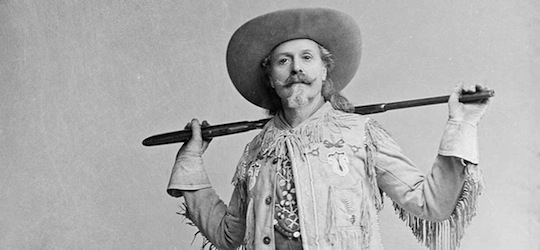Our electronic poster submission will showcase the William F. Cody Digital Archive through which we will introduce viewers to various aspects of the project and discuss the historic and idealized impact that Cody had on the American West and Great Plains. The Archive offers an opportunity to view the historic developments and idealization of the American West through William F. “Buffalo Bill” Cody. Specifically, we will present materials and findings related to Native Americans and Rough Riders, two key groups of performers involved in his Wild West exhibitions.
Category Archives: Presentations
“Buffalo Bill’s Great Plains, 1846-1879,” Douglas Seefeldt, University of Nebraska-Lincoln
Crucial to our understanding of the significance of the Great Plains to Cody’s personal experiences are the early years of Cody’s life, from his birth and early childhood in Iowa in the 1840s through the early 1850s, to his formative years in Kansas from 1852-1868, and his young adult period in Nebraska from 1868-1878. Events that occurred before he wrote his first autobiography and went on to achieve national fame and world-wide celebrity are eventually incorporated first into his stage shows and then into his grand Wild West exhibitions.
“Victoria’s Jubilee, Buffalo Bill’s Wild West, and the (Trans)Nationalist Enterprise,” Frank Christianson, Brigham Young University
In 1887 William F. Cody brought his Wild West show to London where he launched the first of four European tours. Initially linked to London’s American Exhibition, the 1887 tour was limited to Britain playing, over a twelve-month period, to hundreds of thousands at venues from Earl’s Court to Manchester. Cody was embraced by London society playing host to the Prince of Wales and William Gladstone, and giving a command performance for Victoria on the eve of her Jubilee. He also found friendships among stage luminaries including Wilson Barrett, Henry Irving, and Bram Stoker.
Continue reading
“Buffalo Bill Cody and the Auto-American Biography: The Problem of Annotating for Authenticity,” Frank Christianson, Brigham Young University
This paper addresses issues related to the editing of William F. Cody’s autobiographical writing published between 1879 and 1888. The projects include the recently completed The Life of Hon. William F. Cody appearing with University of Nebraska Press in fall 2011 and ongoing work on Cody’s The Wild West in England (also slated for publication with UNP). Both works are part of the press’s Cody Papers Series in conjunction with the Papers of William F. Cody project.
Continue reading
“‘It Was a Damned Bad Day When Columbus Discovered America’: Italian Reception of Buffalo Bill’s Wild West’s Show and (Native)American Reactions to the Cradle of Civilization,” Allessandra Magrin, University of Strathclyde
Buffalo Bill’s Wild West’s show could be envisaged as a pioneering attempt of exporting the newborn American Culture into the Old World, like a sort of backlash colonization. It can be therefore interpreted as an embryonic example of American transnationalism. The Italian stopovers of the Wild West’s tour, although sporadically tackled by previous scholarship, proved to be focal in the construction of a transnational awareness, especially considering the history of mass-migrations of the time. In particular this paper looks at one specific aspect of such perception, which is the two-sided understanding of ‘otherness’, showing the double point of view in which both the Italians and Western (and Native) Americans kept relationships with one another and defined their identities.
“American Exceptionalism Meets Indian Enthusiasm: Germany Welcomes the Wild West,” Julia Stetler, University of Nevada, Las Vegas
Buffalo Bill’s Wild West show spent almost a third of its life in Europe, traveling extensively through Great Britain, Spain, France, Italy, Germany, and Austria between 1887 and 1906. It left behind a lasting impression of America in European minds and inspired countless Western-themed novels, plays, and even fashion. However, it also intersected with ideas about the American West that had already been formed by novels, through journalism, travelogues, immigrant letters, and visual materials such as paintings, prints, and photographs.
“Exceptionalists Abroad: Mark Twain, Buffalo Bill and Venture Cosmopolitanism,” Frank Christianson, Brigham Young University
After watching a Buffalo Bill’s Wild West performance in 1883 Mark Twain wrote to William Cody encouraging him to export the show: “It is often said on the other side of the water that none of the exhibitions which we send to England are purely and distinctively American. If you will take the Wild West show over there, you can remove that reproach.” Four years later Cody would take the show to London and begin one of the most successful and celebrated runs of his career. Twain’s words reflect a century-long American quest to earn cultural legitimacy in the eyes the British. Nineteenth century American cultural history is defined in large part by the exceptionalist enterprise as American writers including Emerson, Whitman, and Melville defined their work in relation to British influence and sought an original American voice in their writing. Many people viewed Twain’s regionalism as one such original moment. And Twain clearly viewed Buffalo Bill’s Wild West as another.
